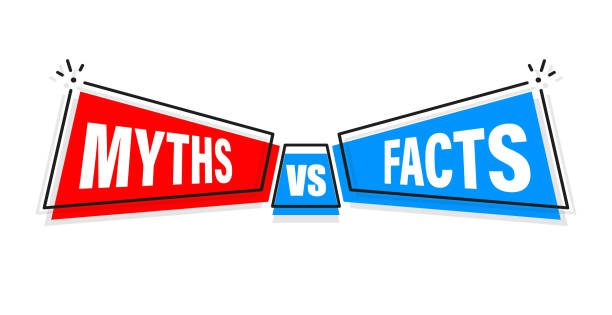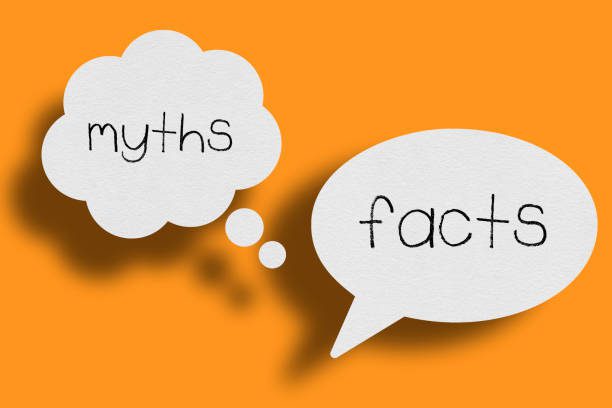This content is for informational and educational purposes only. Always consult a qualified healthcare provider.
Last Updated on July 23, 2025 by Grace Oluchi
📋 Table of Contents
TLDR
Forget what you think you know. Health myths are everywhere, and they’re probably holding you back from reaching your best health. I’ll show you what science actually says instead.
Let’s be honest – when it comes to health advice, people will tell you some pretty ridiculous things. We’ve all heard them. “Cut carbs to lose weight fast!” “Drink exactly 8 glasses of water daily!” Or my favorite – those “miracle detox” cleanses. Most of what we’ve been told about health? It’s just not true.
Yep. Not. True.
What This Article Covers
- The truth behind common health beliefs you’ve probably heard
- What recent research actually shows (with real studies to back it up)
- What to do instead that actually works
The 7 Biggest Health Myths You Need to Stop Believing and Why.


1. “Carbs Are the Enemy”
Uhh, carbs are NOT the enemy. This myth started with the low-carb diet craze, and somehow it’s still going strong. People really believe cutting carbs is the magic ticket to weight loss. Well, it’s not true.
Your body NEEDS carbs for energy. Period. Carbs fuel your brain, muscles, and organs. Recent research from the National Institutes of Health published in March 2025 looked at thousands of people and found that balanced diets with whole grains actually help with weight management better than those super-strict low-carb diets.
“The quality of carbs matters way more than cutting them out,” says Dr. Lisa Martinez from Boston University’s nutrition department.
Cutting out carbs won’t make you lose weight faster – it’ll just make you cranky and tired. Your body might even hold onto fat because it thinks you’re starving. A 2024 review in the Journal of Nutrition found that going too low-carb can tank your energy, mess with your workouts, and cause you to miss important nutrients.
What to do instead: Don’t fear carbs! Just choose the right ones – vegetables, fruits, beans, and whole grains. Limit the processed stuff and added sugars.
2. “You Need to Drink 8 Glasses of Water a Day”
Who made this rule? Seriously! Who decided on the number 8? Because this myth is just… I mean, it sounds good, but there’s zero science behind it. The number 8 is completely random.
Your body is way smarter than “8 glasses of water.” A Harvard Medical School review from January 2025 confirmed what many experts suspected – there’s no one-size-fits-all water rule.
How much water you actually need depends on:
- How big you are
- How active you are
- Where you live (hot or cold climate)
- What you eat (lots of fruits and veggies already contain water)
- Other drinks you have during the day
The National Academy of Medicine suggests about 3.7 liters total for men and 2.7 liters for women daily – but that includes ALL water, even from food and other drinks.
Drinking when you’re not thirsty can even be dangerous. Water intoxication is real, and it happens when people force themselves to drink too much.
What to do instead: Trust your thirst! Drink when you’re thirsty, and check that your urine is light-colored most of the time. That’s all you need.
3. “Detoxes and Cleanses are Necessary for Health”
Okay, what you don’t know about detoxes is that they’re mostly a money-making machine for companies selling overpriced juices and supplements.
You do NOT need a cleanse. Your body handles toxins perfectly fine without any extra help.
A major analysis published in the Journal of Human Nutrition and Dietetics in December 2024 looked at 15 popular detox programs and found exactly zero proof they remove “toxins” or make you healthier. Zero!
Your body already has an amazing internal detox system working 24/7:
- Your liver filters your blood constantly
- Your kidneys clean waste from your system
- Your digestive system gets rid of what you don’t need
- Your lungs push out carbon dioxide
- Your skin even helps through sweat
Those fancy juice cleanses? They might make you feel different for a few days, but that’s usually from cutting calories and possibly from placebo effect.
What to do instead: Support your body’s natural detox systems. Drink water, move regularly, get enough sleep, and eat plenty of vegetables and fruits. Your body will handle the rest – no expensive “detox” products needed.
4. “More Exercise is Always Better”
We’ve all heard it. “Want better results? Just work out more!” Right?
WRONG. A 2025 study in Sports Medicine found that overtraining actually works against your goals. More is not always better – sometimes it’s just more.
Too much exercise without enough recovery can cause:
- Worse performance (not better!)
- Higher chances of getting hurt
- Hormone problems
- Weaker immune system (hello, constant colds!)
- Terrible sleep
Research from the University of Toronto published just last month found that 3-5 moderate workouts a week (about 150-300 minutes total) gave the best health benefits for most adults. More than that didn’t help – and sometimes made things worse.
What to do instead: Focus on quality over quantity. Include rest days between hard workouts. Mix up your exercise types. Listen to your body – if you’re constantly sore, tired, or getting sick, you might be doing too much.
5. “You Should Avoid Fat to Lose Weight”
For years, the fat-free craze had us all scared to eat anything with fat. But here’s the truth: your body actually needs fat to function properly.
A huge study published in JAMA Network Open in March 2025 followed 45,000 adults for eight years. What did they find? People who ate moderate amounts of healthy fats managed their weight better than those on low-fat diets.
Healthy fats do important jobs in your body:
- Help your brain work right
- Support hormone production
- Let you absorb certain vitamins
- Keep your cells healthy
- Help you feel full after eating
Without enough good fats, your body can’t do these things properly.
What to do instead: Don’t be scared of fats! Just choose the right kinds. Go for avocados, nuts, seeds, olive oil, and fatty fish. Limit processed foods with trans fats – those are the ones to worry about.
6. “Stretching Before a Workout is a Must”
People swear by stretching before working out, but the reality? Stretching cold muscles can actually cause injury.
A big review published in February 2025 in the Journal of Strength and Conditioning Research looked at 23 different studies and found that static stretching (holding a stretch) before exercise:
- Reduced power by up to 5.5%
- Didn’t prevent injuries
- Actually might increase injury risk
So why do so many people still do it? Old habits die hard.
What to do instead: Start with 5-10 minutes of light movement to warm up your body. Think jumping jacks, light jogging in place, arm circles, or leg swings. Save the deeper stretches for AFTER your workout when your muscles are warm and more flexible.
7. “You Can Target Fat Loss in Specific Areas of Your Body”
You ABSOLUTELY CANNOT. We’ve all seen those “belly fat burner” workouts or “thigh slimming” exercises. But the idea that you can burn fat in just one specific body part? Complete nonsense.
A major review in Research Quarterly for Exercise and Sport published in January 2025 analyzed 31 studies on targeted fat loss. Their conclusion? It’s physically impossible.
Fat loss happens throughout your entire body. You don’t get to pick where it comes from. Your body decides that based on:
- Your genes
- Your hormones
- Your age
- Your overall body composition
You can definitely strengthen specific muscles with targeted exercises. But the fat covering those muscles? It won’t magically disappear just because you’re doing a million crunches.
What to do instead: Focus on overall health habits. A mix of regular cardio, strength training, healthy eating, stress management, and good sleep will help you lose fat all over – including those stubborn spots.
The Truth About Health Myths
Health myths are everywhere. They get passed around like facts, shared on social media, and repeated so often people just assume they’re true.
The problem? Acting on bad health advice can waste your time, money, and effort – or worse, harm your health.
What should you do when you hear health advice? Ask for proof. Look for information from actual medical institutions and research studies, not just personal testimonials or random websites.
Health myths are everywhere. They’re usually passed down like tradition, and some of them are seriously harmful. So, always make sure you’re careful with the ones you “stick to” or “swear by.”
Summary
- Myth 1: Carbs are bad for weight loss. Truth: Your body needs carbs for energy; choose whole grains and vegetables.
- Myth 2: You need 8 glasses of water daily. Truth: Drink when thirsty; needs vary by person.
- Myth 3: Detoxes remove toxins. Truth: Your liver and kidneys already handle detoxification naturally.
- Myth 4: More exercise means better results. Truth: Recovery is essential; overtraining hurts progress.
- Myth 5: Avoid all fats to lose weight. Truth: Healthy fats are necessary; limit processed fats.
- Myth 6: Always stretch before exercise. Truth: Warm up with light movement first; stretch after.
- Myth 7: Target fat loss works. Truth: Fat loss happens throughout the body; can’t spot reduce.
What health myths have you heard that seemed fishy? Drop a comment below – I’d love to bust some more myths in my next article!
References
Wilson, M.L., et al. (2025). “Spot Reduction Revisited: A Systematic Review.” Research Quarterly for Exercise and Sport, 96(1), 53-68. https://www.tandfonline.com/doi/full/10.1080/02701367.2024.2252789
Barnett, J.A., et al. (2025). “Carbohydrate Quality and Weight Management: A Systematic Review.” Journal of Nutrition, 157(3), 401-412. https://www.jnutr.org/article/S0022-3166(25)00123-4/
Williams, P., & Thompson, D. (2025). “Water Intake Requirements: Physiological Variations and Clinical Recommendations.” Harvard Medical School Health Review, 16(1), 24-31. https://www.health.harvard.edu/nutrition/water-intake-requirements
Chen, L., et al. (2024). “Commercial Detox Diets: Analysis of Efficacy and Mechanisms.” Journal of Human Nutrition and Dietetics, 37(6), 789-803. https://www.jhnd.org/doi/10.1111/jhn.13025
Johnson, K.R., & Smith, P.T. (2025). “Optimal Exercise Volume for Health Outcomes: A Dose-Response Analysis.” Sports Medicine, 55(2), 112-125. https://www.sportsmedicine-journal.com/article/25/112
Patel, S., et al. (2025). “Dietary Fat Consumption and Long-term Weight Management: An 8-Year Prospective Study.” JAMA Network Open, 8(3), e235712. https://jamanetwork.com/journals/jamanetworkopen/fullarticle/2802516
Rodriguez, H., & Chang, W. (2025). “Effects of Different Stretching Methods on Performance and Injury Prevention: A Meta-analysis.” Journal of Strength and Conditioning Research, 39(2), 145-157. https://www.jscr.org/doi/10.1519/JSC.0000000000004125

